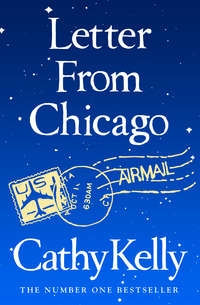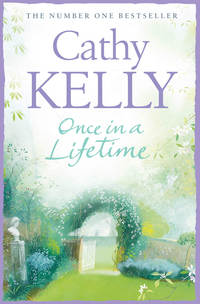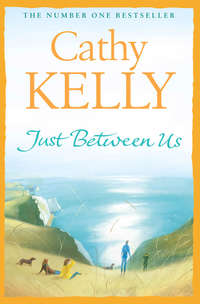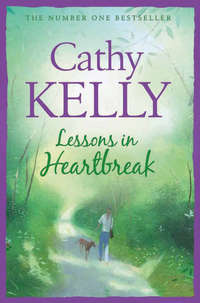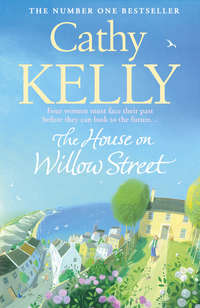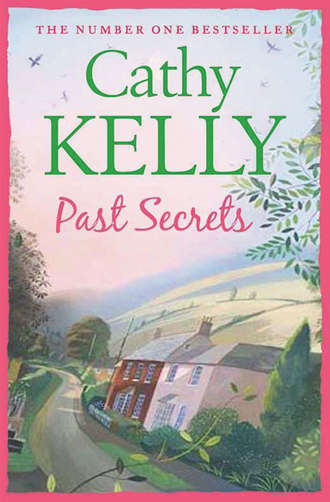
Полная версия
Past Secrets
‘He loves me, he wants to marry me,’ said Sarah with the passion of being nineteen and in love.
‘I just have this feeling that he’s not being entirely honest with you. There’s something a bit two-faced about him,’ Christie had said. It was a flash of knowing that Ted didn’t love Sarah and that there was someone else Ted made promises to.
‘I don’t believe it,’ said Sarah angrily.
Christie noted the anger: there was a lot of truth in the cliché about shooting the messenger.
It transpired that Ted had indeed been seeing another girl, one whose family had money, not like Sarah or Christie, who came from a world of hand-me-down clothes and making do.
‘How did you know?’ asked Sarah when her heart was broken.
‘It sort of came to me,’ Christie said, which was the only way she could explain it.
The closer the person was to her, the fuzzier it became. For herself, she could never see anything. Which was probably as it should be. Except that today, for the first time ever, she’d had a horrible feeling that the premonition of gloom was for herself.
In the pretty kitchen with its bunches of herbs hanging from the ceiling, a place where Christie always felt perfectly happy, panic now filled her. Her family. Something awful must be about to happen to them and she had to stop it. Yet, the feeling had never been like this before. She’d never, ever seen any harm coming to her sons or James.
There was the day thirteen-year-old Shane had broken his collarbone falling from a tree, and Christie had been on a school trip to a gallery, explaining the gift of Jack B. Yeats to twenty schoolgirls.
When the frantic St Ursula’s secretary had finally reached Christie, she’d cursed her own inability to see what mattered. How could she not have seen her own son in pain? What use was her gift if it only worked for other people?
This morning, within ten minutes, Christie had phoned her two sons to say a cheery hello, she was thinking about them and her horoscope had said she was going to have an unfortunate day, and she thought it might extend to them, so not to walk under any ladders.
Finally, Christie phoned James, whom she’d only said goodbye to two hours before as he headed off to the train station for a meeting in Cork.
‘Is everything all right, Christie?’ he asked carefully.
‘Fine,’ she said, not wanting to transmit the intensity of her fear to him. ‘I felt a bit spooked, that’s all. It’s thundery here.’ Which wasn’t true. The sky was as blue and clear as the single oval sapphire in her antique engagement ring. ‘I love you, James,’ she added, which was entirely true. And then the signal on his mobile phone went, the connection was severed and Christie was left with her feeling of terror still beating a tattoo in her chest.
She left a message on her husband’s mobile phone: ‘I’m fine. Off shopping now, phone me later and tell me if you’re able to get the earlier train. I love you. Bye.’
James worked for a government environmental agency and had worked his way up the ranks so he now held a senior position. He travelled round the country a lot, and Christie worried that the endless trips were getting too much for him. But James, still fired up wanting to be busy and to make sure that everything was done properly, loved it.
By ten, Christie was on her way along Summer Street with her shopping bags in her hand, trying to put the fear out of her mind. On the three days a week when she worked at St Ursula’s, she turned left when she walked out of her garden gate. Today, she’d turned right in the direction of the Summer Street Café.
It was a pleasant time of day, with not much traffic. The stressed morning drivers were at their offices and Summer Street belonged to the locals again. Many of Christie’s original neighbours were gone, but there were some who’d lived on the street nearly as long as the Devlin family.
Like the Maguires, Dennis and Una, possessors of a series of clapped-out cars and gloriously oblivious to the outrage of their current next-door neighbour who clearly felt that a car with that many dents in its paintwork should not be parked beside her gleaming BMW. The Maguires had one daughter, Maggie: a good kid, Christie recalled. Tall, shy, always polite, hiding her prettiness behind a heavy veil of carroty red curls as if she needed a retreat from the world. She’d never been in Christie’s art classes but, like many of the girls on Summer Street, she’d had a crush on Shane. Lots of girls had. It was that combination of tousled blond hair and a slightly cheeky smile. He was a few months older than Maggie – extraordinary that they could both be thirty now – and indifferent to her pubescent longing.
‘Just say hello to her,’ Christie said, exasperated that Shane couldn’t see that even a few words from her idol would make a difference to this shy girl.
‘Ah, Mum, she’ll only think I like her. Get real, would you?’
‘What does that mean?’ demanded his mother. ‘Get real? I am being real. I’m saying show a bit of kindness, Shane. It doesn’t cost you anything, does it?’ Her voice had risen up the scale.
‘OK,’ he muttered, realising his mother was off on her high horse about how goodness and kindness filled your soul with happiness. It was a sweet idea and all, but it didn’t work with girls, did it? ‘I’ll say hi, right?’
‘And be nice.’
‘Should I propose as well?’
Maggie lived in Galway now and Christie hadn’t seen her for ages.
But the adult Maggie had lived up to the early promise Christie had seen in her. She was truly stunning-looking, her hair darkened to glossy auburn, her face a perfect oval with silvery cobalt-blue eyes, wide expressive lips and the translucent skin of the pure redhead. Yet she didn’t appear to be aware of her beauty. Rather the opposite, in fact. Christie sensed that Maggie Maguire was still hiding her real self.
‘She’s doing so well,’ Una Maguire said every time Christie asked. All those years ago, Una had been red-haired, too, but now the red was a faded strawberry with fine threads of grey. She was still beautiful, though, with the fine-boned face her daughter had inherited. ‘Maggie’s going out with this fabulous man. He’s a lecturer in the college and she’s in the library research department now. They’re made for each other. Living together for three years and they have a beautiful apartment off Eyre Square. No sign of them getting married, but young people don’t bother with that these days.’
‘No, they don’t,’ agreed Christie easily, who understood quite plainly that Una longed with all her heart for her only child to be settled down with a husband and children.
They’d gone on their separate ways, Christie sure that Una had no notion of what she’d really seen in Una’s heart.
Along with learning about her odd gift, Christie had learned that mostly people didn’t want you to know their deepest, darkest secrets. So she kept her insights to herself unless she was asked.
Ten yards ahead of her, Amber Reid shot out of her gate at number 18, long tawny-gold hair bouncing in the telltale manner of the newly washed. Amber was seventeen, in her final year at St Ursula’s and undoubtedly one of the stars of Christie’s class.
Amber could capture anyone or anything with her pencil, although her particular gift was for buttery oil landscapes, wild moody places with strange houses that looked like no houses on earth. Even in a large class, Amber stood out because she was so sparky and alive.
An unfashionable pocket Venus shape, with softly curved limbs and a small, plumply rounded face, her only truly beautiful feature was that pair of magnetic pewter eyes, with the ring of deepest amber around the pupils. She’d never have been picked as one of the school’s beauties, the languorous leggy girls with chiselled cheekbones. Yet Amber’s vivaciousness and the intelligence of those eyes gave her an attractiveness that few of the teenage beauty queens could match. And the artist in Christie could see the girl’s sex appeal, an intangible charm that a photographer might not capture but an artist would.
Christie knew that unless St Ursula’s had been evacuated for some strange reason that morning, Amber should be in school. And yet here she was, trip-trapping along in achingly high heels and a colourful flippy skirt that flowed out over her hips – unlike the institutional grey school uniform skirt that jutted out in an unflattering A-line. Amber was holding a mobile phone to her ear and Christie could just overhear.
‘I’m just leaving now. Has anyone noticed I’m not there? MacVitie’s not got her knickers in a twist over the absence of her best student?’
Mrs MacVitie was the maths teacher and Christie doubted that Amber, who was typically left-brained and hopeless at maths, was her best student. Favourite, perhaps, because it was hard to resist Amber, who always paid attention in class and was a polite, diligent student. But not best.
She must be speaking to Ella O’Brien, to whom she was joined at the hip, and Ella obviously told her that no, the St Ursula’s bloodhounds had not been alerted.
‘Sweet. If anyone asks, you think I was sick yesterday and it must have got worse. I phoned in earlier and told the school secretary I was sick but, just in case, you back me up and say I’m puking like mad. It’s true,’ Amber laughed. ‘I’m sick of school, right?’
Christie wondered if Faye, Amber’s mother, knew what her daughter was up to.
Faye Reid was a widow, a quiet, businesslike figure who’d never missed a school meeting and was utterly involved in her daughter’s life. Even though they lived on the same street, Christie didn’t see much of Faye. She kept herself to herself, head down, rushing everywhere, clad in conservative navy suits and low-heeled shoes, with a briefcase by her side. There was such a contrast between the butterfly beauty of Amber who had the best of everything and caught people’s eyes, and her mother, who always appeared to be rushing to or from work, trying hard to keep the mortgage paid and food on the table. A person didn’t need Christie’s gift of intuition to see that Faye’s life had been one of sacrifices.
‘She’s one of the most gifted students I’ve ever taught,’ Christie had told Faye two years before, shortly after Amber arrived in her class. ‘Any art college in the world would love to have her.’
And Faye’s face had lit up. Christie had never seen a smile transform a person so much. Faye was defiantly plain beside her daughter, overweight to Amber’s curved sexiness and with her brown hair pulled severely back into a knot that only someone with the bones of a supermodel could get away with. Faye Reid didn’t have the supermodel bones. But when she smiled that rare smile, she suddenly had all the charm of her daughter and Christie caught herself wondering why a woman like Faye, who could only be forty, lived such a quiet life. No man had ever been seen kissing Faye a wistful goodbye on the doorstep. Her clothes, the discreet earrings and low shoes that screamed comfort – they were like armour. It was as if Faye had deliberately turned her back on youthful sexiness and hidden behind a façade of plain clothes.
Christie wondered if she could see more…but suddenly, it was as if Faye Reid had abruptly closed herself off and Christie could see nothing but the woman in front of her.
‘Thanks, Mrs Devlin,’ Faye said. ‘That’s what I think too, but I love her so much, I thought I was totally biased. Every parent thinks their kid is Mozart or Picasso, don’t they?’
‘Not all,’ replied Christie grimly, thinking of some of the parents she’d met over the years with no belief in their kids whatsoever.
Her comment apparently touched a chord with Faye and the smile vanished to be replaced by her more usual, sombre expression. ‘Yeah, you’re right,’ she said, nodding. ‘There are always a few who don’t appreciate their kids. Nothing that twenty years of psychotherapy wouldn’t cure.’
Up ahead, Amber said a cheery ‘byee’ into her phone. Christie knew that the correct teacher response at this point would be to catch up with her and ask what she was doing out of school. But suddenly Amber broke into a run, high heels notwithstanding, and was gone down the street before Christie could move.
Christie shrugged. Amber was a good student, hardly a serial absentee. She and Ella had never been part of the school’s wilder cliques and had both managed to move from adolescence to young womanhood without any noticeable bursts of rebellious behaviour.
There might be a perfectly good reason for her absence today. And Christie herself knew that you could learn plenty of things outside school as well as in.
When she’d been young, she hadn’t done everything by the book either.
Yet again, Christie thought about the past and the places she’d lived. The house in Kilshandra with bitterness and misery engrained into the wallpaper so that she’d barely been able to wait till she was old enough to leave. The bedsit on Dunville Avenue where she’d met so many friends and learned that she didn’t have to hide her gift. And Summer Street, where all the best things in her life had happened.
She could remember what the young Christie had looked like when she’d moved to Summer Street – long dark hair drawn back in a loose ponytail, always in jeans and T-shirts – and she could remember how lucky she’d been, with a kind husband, enough money so they weren’t in debt, with one beautiful, healthy child and another on the way. Yes, the years on Summer Street were the ones she liked to remember.
But there were other times she’d like to forget.
The strange feeling came through her again and despite the warmth of the morning, Christie shivered.
CHAPTER TWO
Amber Reid was concentrating so fiercely on getting to the bus stop in time that she hadn’t noticed Mrs Devlin walking along Summer Street behind her. This was despite her intention to watch out for anyone who might sneak to her mother about her appearance out of uniform on a school day.
‘We’re going on a field trip,’ Amber had planned to say blithely should the need arise, though the final-year students at St Ursula’s didn’t have time for field trips this close to the all-important state exams. And even if they did, what sort of field trip would require her best high heels – Oxfam spindly sandals revitalised with bronze paint – a sliver of a silk camisole and a flippy skirt, all topped off with the curious and fabulous silver tiger’s-eye pendant she’d recently found buried in her mother’s bottom drawer? The pendant was a mystery. She’d never seen her mum wear it. Faye dressed in boring suits and was resolutely against making the best of herself, no matter what Amber said. The pendant was so not ‘her’. Amber was still wondering where her mother had come by such a thing. She didn’t like to ask, because Mum would be hurt that she had been snooping. But it was odd of her to keep it hidden because they shared everything.
Well, not everything. Amber felt a splinter of guilt pierce her happy little cocoon. Today was a secret she couldn’t share with her mother. It wasn’t the first time she had concealed something. Mum was so square, so protective, that on the rare occasion that Amber had done anything outside her mother’s rigid code of what was acceptable, she’d had to fib a little. But the current secret was certainly the biggest.
Ella had phoned just as Amber slammed the front door behind her.
‘Ring me later and tell me how you got on, won’t you?’ Ella begged.
‘Promise.’
‘Wish I was bunking off,’ Ella grumbled. ‘I’ve history in ten minutes and I haven’t finished my bloody essay on the Civil War.’
‘Sorry, I did mine and I could have lent it to you so you could use some of my ideas,’ Amber apologised. She loved history and the words flowed effortlessly from her pen to the page. Although how she’d written her essay last night was largely a mystery, as she’d been consumed with excitement thinking about today.
When she’d said goodbye to Ella, she broke into a run so as to race past the Summer Street Café in case of neighbours lurking within.
A minute later, she was at the bus stop on Jasmine Row, just in time to catch the 10.05 bus into the city, and Karl.
Karl. She whispered his name to herself as she gazed dreamily out of the windows on the top deck. Karl and Amber. Amber and Karl.
It sounded just right, like they were destined to be together.
Destiny had never been a concept Amber had held much faith in up to now. Just a few weeks away from her eighteenth birthday, and a month from the hated exams, she felt that she was in charge of her own life.
So she’d only been half paying attention when Ella read their horoscopes that fateful Friday at lunch. Horoscopes were fun but hardly to be relied on. Mum always insisted that Amber was responsible for herself and that life should not be lived on the word of what some astrologer had dreamed up for that day.
Mum was firm that Amber should never follow the crowd or do anything just because of someone else’s opinion or because ‘everyone else is doing it’. It was a lesson Amber had followed very well up to now.
‘Crap for Aries, as usual,’ muttered Ella, reading hers quickly. ‘“Rethink your options but don’t let your enthusiasm wane.” What does that mean? Why doesn’t it ever give us hints on what’s coming up in the maths paper? Now that would really be seeing the future.’
They were eating lunch on the gym roof – strictly forbidden but the current cool spot for sixth years – plotting their weekend and how to fit exam study in around at least one trip to the shopping centre to flip through rails of clothes they couldn’t afford. All study and no play made you go mad, Ella insisted.
‘Yours is better. “Single Taureans are going to find love and passion. Expect sparks to fly this weekend.”’
‘Sparks at the football club disco?’ Amber roared with laughter at the very ridiculousness of this idea. It was the same big gang of people she’d known all her life and you couldn’t get excited about a bunch of guys you’d watched grow up. Where was the mystique or the romance of that?
‘Patrick?’
‘Too nice. He’d want to walk along with his hand in your jeans pocket and yours in his and discuss the engagement party. Gross.’
‘Greg’s cute.’
‘He called me Chubby Face once. No way.’ Growing three inches taller in the past year meant Amber had gone from being childishly plump to womanly and voluptuous. The addition of honeyed streaks in her rich brown hair meant that all the boys who’d previously talked to her like a clever younger sister suddenly sat up and took notice.
This new power over guys was heady and Amber was still testing it, gently. But she wanted to go somewhere more exciting than the football club disco to do so. Somewhere, beyond the confines of Summer Street, the football club disco and St Ursula’s was Life with a capital L: pulsing, exciting, waiting for her.
‘You’re getting so choosy,’ said Ella. ‘You fancied Greg last year.’
‘That was last year.’
‘Should I get more highlights?’ asked Ella, pulling forward a bit of the long, streaky blonde hair that was almost mandatory in sixth year and examining it critically. ‘Your highlights look great but mine have gone all dull and yellowy.’
‘Use the special shampoo for blondes,’ said Amber.
‘It costs a fortune. I bet your mum buys it for you. Mine wouldn’t.’ Ella was indignant. Because there were only the two of them, Amber’s mum bought her everything she wanted, while Ella’s, with three older sons as well, could hardly do the same thing.
‘I’ll give you some of my shampoo,’ offered Amber. She knew how lucky she was and always shared any goodies with Ella. That’s what best friends were for. ‘Now, tomorrow night.’ The pewter eyes gleamed. ‘Not the football club disco, please.’
‘Well…’ Ella began. ‘We could try something different.’
‘…Something bad…’ Amber shivered deliciously. ‘Let’s try to get into a grown-up club. Come on, in a few months, we’ll have left school and we’ll be the only people in our class to have never done anything interesting, Ella. Everyone else has gone to clubs they’re not supposed to be able to get into, except us because we’re the sensible ones. I’m fed up being sensible.’
Sensible was nice when you were thirteen and adored by all the teachers, but less so when you were nearly eighteen. The girls who never had their homework done and never got top marks in exams seemed to be having all the fun now, which seemed like an unequal division of spoils.
‘Me too,’ Ella breathed. ‘And I’ve just thought how we can do it.’
Amber’s eyes glittered. ‘How?’
This feeling of dissatisfaction had in fact been incubating for weeks. Fed up with studying for exams and stifled by the pressure-cooker atmosphere at school, they felt the need to do something wild and rebellious for the first time ever, but their options were limited.
Most of their pocket money went on clothes or their mobile phone top-up cards, so they had little cash left over for wild behaviour.
Smoking was considered cool by some of the older girls, who insisted that it kept them thin, but cigarettes were too expensive to be more than a rare treat. Alcohol was easily available, like hash and ecstasy, but Amber’s mother had a nose like an airport sniffer dog and could smell badness anywhere, so coming home drunk or stoned was hardly an option. Faye would have had a fit and grounded her for a month, not to mention being hurt by her daughter’s behaviour, which would, in turn, make Amber feel bad for failing her beloved mother.
And that was the crux of the matter: their family unit was just two. Two people who adored each other, two people who’d gone through it all together, who protected each other from the world. But sometimes, that could be a burden too.
At least Ella had three brothers who could share living up to their parents’ expectations: Amber had the weight of her mother’s hopes and dreams resting squarely on her shoulders alone. And unlike Ella’s parents, who seemed to understand that their kids eventually tested their wings and flew the nest, Faye Reid still seemed to think that she and Amber would be together for ever.
‘What’s the plan?’ Amber asked now. ‘Where are we going? Nowhere round here, surely? There’s nothing but boring pubs.’
‘Exactly. So forget about round here.’ Ella grinned excitedly. ‘Marco’s going into town to a club tomorrow night, and if we went with him, we could get in without being carded.’
Marco was Ella’s middle brother and they both realised he was their best bet for an illegal excursion. Her eldest brother wouldn’t dream of taking two schoolgirls into a city nightclub, while her youngest brother was too square to go at all. But twenty-three-year-old Marco, who had his own late-night show on a small radio station and went to all the coolest places, just might be persuaded to take them with him.
‘Where?’ asked Amber.
‘Highway Seven.’
‘That’s twenty-ones and over.’ It was hopeless. Doormen were up to speed on the best fake IDs. Amber and Ella didn’t even have fake IDs. All the best clubs were over twenty-ones only. They’d be busted before they got in the door.
‘Yeah, but there’s a gig on there tomorrow night, some new band Marco’s going to check out for his show,’ Ella explained. ‘He’ll be on the guest list and he’ll be going in the back door of the club, so the bouncer will let him in no hassle, and if we’re with him…’
‘…We’ll waltz right in,’ laughed Amber gleefully. ‘You are one clever chick, Ella O’Brien. But how do we get Marco to take us in the first place?’
‘Bribery and corruption.’ Ella had thought it all out. ‘We’ll twist his arm this evening after school.’
Marco looked a lot like Ella: dark eyes, pale skin and the same dark hair as she’d had before she discovered peroxide. Easy-going to a fault, he wasn’t keen on taking his little sister and her friend out with him.
‘In your dreams,’ he said.
‘Mum would go mental if she knew you’d had that huge party in the house when the rest of us were in Kerry at Christmas,’ Ella said, all wide-eyed innocence. ‘The one where the neighbours called the police. You’d be chopped liver if she ever found out. You know what she’s like about not upsetting the neighbours…’


